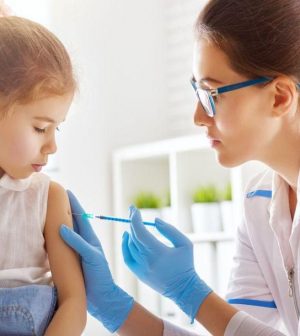- Recognizing the Signs of Hypothyroidism
- 10 Strategies to Overcome Insomnia
- Could Artificial Sweeteners Be Aging the Brain Faster?
- Techniques for Soothing Your Nervous System
- Does the Water in Your House Smell Funny? Here’s Why
- Can a Daily Dose of Apple Cider Vinegar Actually Aid Weight Loss?
- 6 Health Beverages That Can Actually Spike Your Blood Sugar
- Treatment Options for Social Anxiety Disorder
- Understanding the Connection Between Anxiety and Depression
- How Daily Prunes Can Influence Cholesterol and Inflammation
Parent’s Words Key to Young Kids’ Fears Around Vaccination

What’s the best way to help your young child handle the stress of getting shots? New research claims that perfectly timed encouragement makes all the difference with vaccinations.
“What we found is that in the first minute after the needle, the more parents said coping-promoting statements, such as, ‘You can do this’ and ‘It will be over soon’ or tried to distract them with talking about something else, the higher distressed the children were. This really surprised us,” said study senior author Rebecca Pillai Riddell, a professor in York University’s Department of Psychology, in Toronto.
“We found however, during the second minute after the vaccine, when the child was calmer, these same coping promoting statements resulted in them calming down faster,” she said in a university news release.
“On the other hand, distress-promoting statements, such as criticizing the child or reassuring them they were fine, had no relationship with child distress in minute-one, but in minute-two the distress-promoting comments were strongly predictive of higher distress in kids,” Pillai Riddell added.
The study observed how hundreds of parents handled their preschool children after the youngsters received vaccinations. It’s part of the largest study in the world assessing caregivers and children during vaccinations from birth to age 5, researchers said. The findings were published recently in the journal PAIN.
“Previous research has shown that the vast majority of preschoolers calm down within two minutes after a vaccination, however, about 25% of children did not. We wanted to determine what parents were saying before or during the vaccination appointment that could be leading to these children feeling distressed during and after a vaccination,” said study first author Ilana Shiff, a master’s student in Pillai Riddell’s lab.
The findings suggest that in the first minute after a child is vaccinated, parents should keep them calm through physical approaches such as hugging, cuddling or hand-holding.
After that first minute, children get more benefit from encouraging statements from their parents.
“This type of data has never been found in preschoolers before,” Pillai Riddell said. “It’s important to understand post-needle reactions at this age because needle phobia and phobias in general start coming on at 5 to 10 years of age, so understanding how children can be coached and how parents can have a really powerful role in reducing stress post a vaccination is key.”
More information
The American Academy of Pediatrics offers advice on managing pain during vaccinations.
SOURCE: York University, news release, July 12, 2021
Source: HealthDay
Copyright © 2026 HealthDay. All rights reserved.










